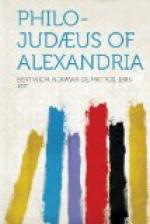Jews of, referred to, in Talmud, 42;
Philo forced into Sanhedrin of, 61, 202, 203 f.;
Philo member of, 61;
disintegration of community at, 71;
Zealots flee to, on fall of Jerusalem, 71;
replaced by Babylon as centre of Jewish intellect, 73;
Samaritans in, 106;
antinomian movement in, 130;
prototypes of Christian belief at, 155;
Pythagorean influence at, 188;
national life and culture undermined at (see National), 218.
Alexandrian, exegesis, characteristic
of, 36;
church, departs from Jewish
standpoint, 72;
Platonists, connection between
Philo and later school of, 192;
schools, relation of, to Palestinian,
199 f., 213;
literature in the Dark and
Middle Ages, 225 f.
Allegories of the Laws, an allegorical
commentary, 74, 87 f.;
attacks Stoic doctrines, 94;
the Epistles, lineal
descendants of, 247.
Angels, doctrine of, in Palestine, 140;
Philo’s treatment of,
150-1.
Antiochus Epiphanes, Palestine passes to, 17.
Anti-Semitic, party, Flaccus won over
by, 65;
literature and influences
in Alexandria, 22, 62, 67, 74;
party, punishment of, at Rome,
70.
Apion, a Stoic leader, 63;
accuses Jews, 63, 67;
Philo’s references to,
63, 101;
Josephus’ reply to,
65.
Aquila, new Greek version of Old Testament
made by, 224;
rabbis’ views of, 224.
Aristeas, spirit of, glorified in Philo, 77.
Aristobulus, first allegorist of Alexandria,
38;
his spirit inherited by Philo,
77;
on wisdom, 143;
on the Word of God, 146;
difference between Philo and,
168.
Artapanus, Jewish apologist, 77.
Assouan, Aramaic papyri at, 15.
Babylon, replaces Alexandria as centre
of Jewish intellect, 73;
Greek culture forgotten in,
224.
Bible, the, Philo’s interpretation
and views on, 49, 102, 108
ff.;
Philo reveals spiritual message
of, 83;
authority of, challenged at
Alexandria, 92;
wisdom personified in, 141,
142.
Cabbalah, the, Essenes practitioners in,
233;
Philo as the Hellenizer of,
235.
Caligula. See Gaius.
Chaldean, thought, Philo’s acquaintance with, 48.
Christian, monastic communities, 73;
heresy, a severance from main
community, 72;
theologians, fail to realize
spirit of Philo, 124;
reformers, and the yoke of
the law, 130;
teachers preserve Philo’s
works, 156, 248;
writers quote Philo, 223;
apologists imitate allegorical
method, 245.
Christianity, the movement towards, 28;
rise of, 42;
conflict with Judaism at Alexandria,
72;
Philo’s writings regarded
as testimony to, 156;
Philo’s influence over
religious philosophy of, 195.




